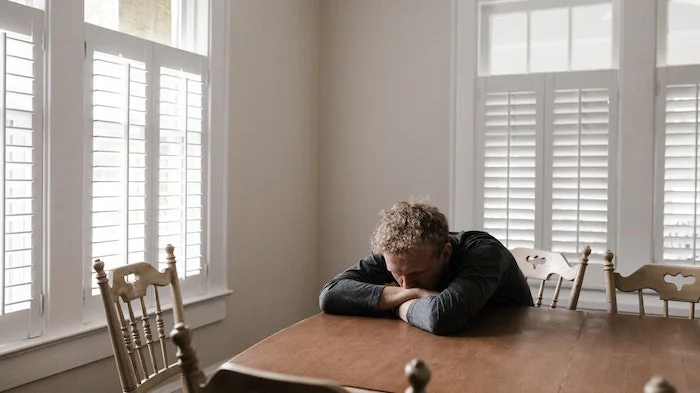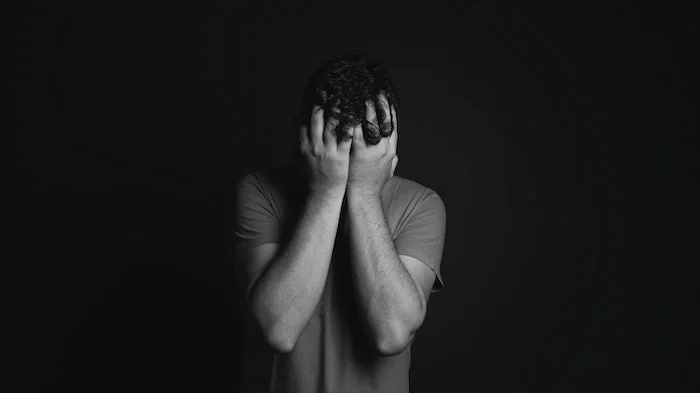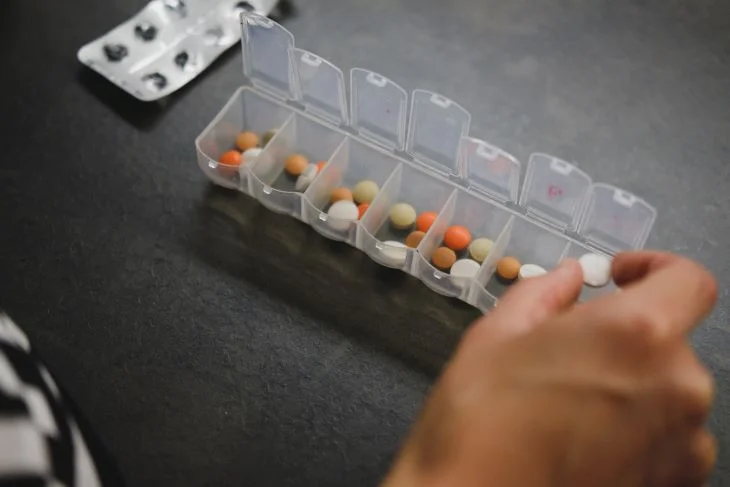How Long Does Xanax Withdrawal Last?
Xanax is a prescription drug that helps to reduce anxiety and make people feel more relaxed and less stressed.
Whilst some people use Xanax is a monitored and healthy way, others can become addicted to Xanax and how it makes you feel.
For those living a particularly stressful life, they might become reliant and dependent on Xanax to function day to day.
When this happens, your body becomes dependent on Xanax and withdrawing from the drug has the potential to become dangerous and in some cases, even life-threatening.
What is Xanax?

Xanax is a drug that people use to feel more relaxed and less stressed and anxious. Xanax works by targeting the chemicals in your brain, so that you feel less anxious and overall happier.
You might feel like you finally feel calm, and although the stressors and triggers in your life won’t have disappeared, your whole approach to them will be different.
Unfortunately, overuse of Xanax can make you feel incredibly tired, drowsy and unmotivated.
When they take too much Xanax, they might even start to feel like they might pass out.
Some people are able to tolerate a high amount of Xanax before they start to experience any negative side effects, whereas others only have to take a little bit of the substance before experiencing the negative side effects of abusing the drug.
Xanax works by targeting the GABA-A receptor within the brain. This is the receptor that is responsible for making people feel relaxed and calm.
However, when an individual withdraws from taking Xanax (that is, that they stop taking Xanax for a period of time) they start to feel some rather unpleasant side effects [1].
When you withdraw from using Xanax, you could experience a range of different symptoms including panic and anxiety attacks, shaking, seizures, and a range of other scary and life-threatening withdrawal symptoms.

Depending on how dependent your body is on the addictive substance, these withdrawal symptoms could last for a number of days or even sometimes weeks.
Xanax is a type of benzodiazepine, and because of this Xanax is good at targeting the brain and the brain’s chemicals very quickly.
This means that when you first consume Xanax, you will start to feel its effect almost straight away. This relief will also last for a number of hours afterwards.
However, because of this, Xanax has become highly addictive and also means that you have to endure unpleasant withdrawal symptoms and side effects.
Unfortunately, more and more people across the world are becoming addicted to Xanax. In fact, a recent study found that there are now almost 32 million people across the world who are currently frequently prescribed a benzodiazepine drug [2].
Sedatives like Xanax are the second most commonly abused drug throughout the world.
If you think that you or someone you know is addicted to Xanax, then there are a number of treatment options available to you
Various medications and therapy techniques are offered at inpatient rehab centres and outpatient rehab centres across the UK.
What type of treatments you will require in order to recover from your addiction to Xanax will depend on a number of different factors, including how long you have been addicted to Xanax for, whether you abuse any other drugs or substances, and how much Xanax you usually take.
Why do people become addicted to Xanax in the first place?

As discussed above, Xanax is a commonly prescribed drug used throughout the UK to treat things such as anxiety and panic disorders.
Unfortunately, when abused Xanax can have some unpleasant side effects and symptoms. Moreso, withdrawing from Xanax can be incredibly dangerous.
For this reason, not everyone is prescribed Xanax. Only those who are suffering from severe anxiety and panic disorders are given Xanax as a form of treatment.
However, as we know all too well, you can easily abuse any drug or medication.
People tend to become addicted to Xanax and start to abuse the drug because of the sedative effect it has. People are usually prescribed Xanax because they feel anxious and panicky, so the idea of feeling calm and tranquil seems very attractive to them.
People might start to take Xanax if they suffer from a lot of stress and pressure at work.
They might have an important meeting coming up, and decide to take a Xanax so that they are able to feel calmer.
However, they might then start to take a Xanax before every presentation or big meeting, and before they know it, taking a Xanax to get through their working day has become the ‘norm.’
How Addictive is Xanax?

Xanax is a controlled substance, which means that it is regulated
The medical industry accepts that there are great medical uses and benefits to the drug. However, they also accept that there is also the risk that the drug might become addictive if it is abused.
Xanax tends to kick in very quickly when first consumed, which means that individuals are able to benefit from taking the drug almost immediately.
This in itself means that the drug can become highly addictive, as people tend to crave the positive side effects that you get almost immediately from taking the drug.
Numerous studies have also now shown that people who also suffer from addictions to other substances and drugs, or who have previously suffered from a substance use disorder are also a lot more likely to become addicted to drugs such as Xanax.
Likewise, people who are addicted to Xanax are also more likely to experiment with other drugs and become addicted to them later down the line [3].
People also become addicted to Xanax quite easily because the withdrawal symptoms can be rather unpleasant, which means that they avoid withdrawing and detoxing from the addictive substance because they wish to avoid experiencing those unpleasant side effects and symptoms.
What Happens When You Withdraw from taking Xanax?

When you withdraw from taking Xanax, you will experience a range of unpleasant withdrawal symptoms.
How severe these withdrawal symptoms are will depend on a number of factors, including some of the following factors [4]:
- How long you have been addicted to Xanax for
- How frequently you abuse Xanax
- How much Xanax you take on a daily basis
- Whether you abuse other drugs or substances such as cocaine, heroin or cannabis
- How fit and healthy you generally are
Xanax Withdrawal symptoms

When you withdraw from Xanax, you will experience a number of both physical and mental side effects and symptoms.
Some of theseare listed further below.
Physical withdrawal symptoms
- Struggling to sleep
- Headaches
- Excessive sweating
- Getting the shakes
- Increased heart rate
- Seizures
- Insomnia
- Panic attacks
- Struggling to breath
- Muscle spasms
- Feeling sick
- Being sick
Psychological withdrawal symptoms
- Feeling anxious
- Having a panic attack
- Struggling to focus or concentrate on anything
- Feeling depressed or suicidal
- Feeling confused and disorientated
- Feeling restless and uneasy
- Hallucinating
- Feeling out of touch with reality
If you frequently abuse Xanax and have stopped recently for whatever reason, then you might start to experience any of the above withdrawal symptoms within just a few days of withdrawing from Xanax.
These symptoms could last several days or even a few weeks. How severe these withdrawal symptoms are mainly depends on how severely addicted to Xanax you are when you start to withdraw.
How Long Does Xanax Withdrawal Last?

Xanax has a short half-life. This means that it takes effect very quickly and is absorbed into the body quickly. This also means that it tends to leave the body relatively quickly, too (compared to other drugs and substances of a similar nature).
Once you stop taking Xanax, you will start to experience withdrawal symptoms within around a day, or even sometimes between 6 – 12 hours [5].
How long your withdrawal from Xanax lasts will depend on several different factors including how severe their addiction is.
Most withdrawal symptoms for Xanax last anywhere between 1 week and 4 weeks.
Unfortunately, the longer you withdraw from the substance, the more intense your withdrawal symptoms will be. This means that the longer it goes on for, the harder it gets to remain in withdrawal and not abuse again.
Your withdrawal symptoms will also change as you go through the withdrawal process.
For example, if you are only a few days into your withdrawal, you are said to be in the early withdrawal symptoms phase.
When you are a week or so into your withdrawal, you are in the acute withdrawal symptoms phase.
When your symptoms are at their worst, you will be experiencing late withdrawal. This usually happens just after a week into your withdrawal and means that your withdrawal symptoms will be at their most aggressive.
Can You Quit Xanax Suddenly?

It is not advised to stop taking Xanax all together and suddenly. Whilst many people might think that quitting ‘cold turkey’ is a good thing, when it comes to Xanax quitting cold turkey can lead to a number of health issues and complications, including seizures.
Unfortunately, this can be very difficult and dangerous if you are withdrawing at home, especially if you are on your own.
If you were to experience a seizure whilst trying to quit taking Xanax cold turkey, then you could be at risk of cardiac arrest [6].
In addition to this, withdrawing abruptly from Xanax can lead to a number of mental health issues, as it puts a huge strain on your mind.
You will not only have to cope without taking Xanax for the first time in a while, but you will also be more at risk of suffering from things such as anxiety and depression.
Xanax Withdrawal Timeline

Lots of people experience withdrawal symptoms just a few hours into their withdrawal. Most people tend to experience them within 24 hours, but this will certainly depend on how severe your addiction was in the first place.
These symptoms will then last a number of days or even sometimes weeks.
Unfortunately, people can become dependent on drugs such as Xanax after using it for just a few weeks.
If you Xanax consistently for a number of months, then it will result in moderate to severe withdrawal symptoms [7].
Those with a really severe addiction to Xanax have been known to experience withdrawal symptoms for months or even years after first withdrawing from the substance.
Below is an example timeline, laid out in stages of how a typical withdrawal would look:
Stage 1: The Start of your Withdrawal
Once you start to withdraw from Xanax, you will start to experience withdrawal symptoms within just a day or day from your last ‘fix’ [8].
At this stage, you will be said to be at the acute stage of your withdrawal symptoms. This means that you will start to feel anxious, tired and will suffer from things such as headaches.
Unfortunately, lots of people relapse at this stage, as they start to feel anxious and want to use Xanax to rid them of their anxiety.
Stage 2: The Rebound
Within a week or two of withdrawing, you will be at the rebound stage. This is when your symptoms will start to lessen.
You will still feel anxious and will be struggling to sleep, but the headache and flu-like symptoms will start to lessen.
However, you will now start to experience some stomach issues, with stomach aches and issues going to the toilet.
Stage 3: The Recovery
The recovery stage of your withdrawal from Xanax might take a while. For some people, this will happen within a few weeks of withdrawing, whereas for other people some ongoing symptoms might last years.
For example, some people in recovery report having stomach issues for years after first withdrawing from Xanax.
This is why it is incredibly important to get professional help for your withdrawal.
Some of the above symptoms can also be incredibly severe if left untreated, which is why it is important to withdraw from Xanax in a controlled environment, such as a rehab centre.
By withdrawing from Xanax at a rehab centre, your withdrawal symptoms will be monitored by trained professionals and doctors. Each withdrawal is different, which is why it is always important to put yourself in a safe environment before choosing to withdraw from Xanax.
Xanax Withdrawal Complications

It is incredibly important to withdraw from Xanax in a safe and controlled environment, such as a rehab centre.
Withdrawing without medical supervision can result in a number of withdrawal issues and complications, which could be life-threatening if not managed well.
If you do not get help when it comes to withdrawing from Xanax, then you are at risk of falling into a coma, developing PTSD, psychosis, hallucinations and delirium tremens.
These withdrawal symptoms will be particularly difficult to manage if you have been addicted to Xanax for more than three months.
You should bear in mind that you will need to ease yourself into your detox and withdrawal so that you do not go ‘cold turkey’ and overwhelm your body by withdrawing all at once.
Medically Assisted Xanax Detox

By attending a rehab centre to undergo a withdrawal from Xanax, you will receive a range of different treatments.
You will be monitored during the early stages of your withdrawal, and will be supported by a range of physical medication and psychological support.
The aim of any rehab centre is to make your detox, withdrawal and recovery as safe as possible, which is why you will be monitored around the clock to ensure that your withdrawal symptoms do not become severe or life-threatening.
You will be offered some withdrawal medication, and some therapy techniques in order to support your detox and withdrawal.
Medications Used to Treat Xanax Withdrawal Symptoms

As discussed above, you might be offered certain types of medications in order to help to treat and manage your withdrawal symptoms.
In some cases, people might choose to replace Xanax with other benzodiazepines, such as clonazepam or diazepam, which tends to stabilise and lessen your withdrawal symptoms from Xanax [10].
Other doctors might prescribe you a drug called Flumazenil, which tries to block the benzodiazepine within your body from reaching your receptors.
This aims to lessen your symptoms.
Can You Detox From Xanax at Home?

Some people choose to detox from Xanax in the comfort of their own home. This is what the medical profession calls a ‘home detox.’
Whilst some people might be eligible for a home detox, others will not.
You will only be able to detox from home if you suffer from a mild addiction to Xanax.
If you do qualify for a home detox, then you will be sent any medication that you might need in the post and will have phone calls with doctors on a daily basis to check in on you.
However, those who suffer from a severe addiction to Xanax will not be eligible for a home detox, as you will need more one-to-one care and support in order to withdraw safely.
Which drugs can interfere with processing Xanax?

There are a number of other medications and drugs that can interfere with your withdrawal from Xanax. You should try to avoid taking any inhibitors, as these might slow down your body’s detoxification mechanisms which will be working hard to rid your body of Xanax.
This means that your body won’t be able to process Xanax as quickly, and your withdrawal symptoms might be prolonged.
A list of some inhibitors to avoid whilst withdrawing from Xanax are listed below:
- Contraceptive pills
- Any type of medication that might be used to treat some form of fungal infection
- Certain medications used to treat issues in the stomach, such as stomach ulcers or acid reflux
- Antidepressants
- Certain antibiotics
If you or someone you know needs to undergo a detox and withdrawal from Xanax, make sure that they are not on any of the above medications before deciding to withdraw and take any withdrawal medication.
If you are ever in doubt, then make sure that you speak to a healthcare professional.
Treatment options for an addiction to Xanax?

If you are suffering from an addiction to Xanax, then there are a number of treatment options available to you. If you suffer from a severe addiction, then you will need to attend inpatient rehab treatment in order to recover.
If your addiction to Xanax is less severe then you might only need to attend outpatient rehab treatment.
Whilst at rehab, you will first undergo a detox from Xanax.
Once this detox is complete, you will then be required to attend a number of different rehab therapy sessions with a psychotherapist or addiction counsellor.
There are a number of well-known, tried and tested therapy techniques available in most rehab centres across the UK.
Whilst you might not have tried some before, it is important to keep an open mind when it comes to rehab treatment for an addiction to Xanax.
Some of the most popular therapy techniques are listed below.
Be sure to remember that, whilst not every treatment option will work for you, it is important to try them all to see what works for you and what does not.
One-to-one therapy
When you first attend rehab and undergo your detox, you will first be offered one-to-one, individual therapy. This type of therapy is really popular, and is often used to perform other types of therapy such as cognitive behavioural therapy and motivational interviewing.
Cognitive Behavioural Therapy (CBT)
Cognitive Behavioural Therapy (CBT) is a form of one to one, talking therapy. The aim of CBT is to change the way that you think, feel and behave. It will also aim to get to the bottom of your triggers and addiction.
Group Therapy
Group therapy is also a hugely popular treatment option when it comes to addiction issues. You will get the chance to meet other like minded people who also suffer from addiction issues. This is your chance to listen and learn from other people in an attempt to understand your addiction more and recovery.

Holistic Therapy
Holistic therapy is another popular treatment option for those who suffer from addiction issues. Holistic therapy allows you the chance to try a range of different therapies and activities such as art therapy, music therapy, singing, dancing or walking.
Hypnotherapy
Hypnotherapy is another form of therapy used to treat those with addiction issues. During one of your hypnotherapy sessions, you will be put into a relaxed state, whilst being asked to imagine your recovery journey.
You will be in a heightened state of concentration and focus, and can help you to feel more calm and relaxed.
Talk to Someone at Rehab Recovery

If you or someone that you know is suffering from an addiction to Xanax, then you need to get help.
If you or your loved one is suffering from a severe addiction, then they might need to attend inpatient rehab treatment. If they suffer from a mild or moderate addiction then they might only need to attend outpatient rehab treatment.
If you are unsure what type of treatment you or your loved one needs to undergo in order to recover, then speak to someone at Rehab Recovery.
Our team of specialists and advisors are on hand to guide you so that you make the right decision.
Our team of advisors will be able to guide you on what type of treatment you or your loved one might need, and where they might be able to gain access to this treatment locally to them.
References
[1] Benzodiazepines and Opioids, National Institute on Drug Abuse. (2022). https://www.drugabuse.gov/drug-topics/opioids/benzodiazepines-opioids
[2] Benzodiazepine Withdrawal Syndrome: Presentations and Emergency Department Management. (2017).
[3] American Psychiatric Association. (2013). Diagnostic and statistical manual of mental disorders (5th). Arlington, VA: American Psychiatric Association
[4] Food and Drug Administration. (n.d.). Xanax (alprazolam) tablets, for oral use
[5] Food and Drug Administration. (2011, June). Xanax (alprazolam tablets, USP)
[6] Huff, J.S., & Murr, N. (2022, May 8). Seizure. StatPearls Publishing
[7] Hood, S. D., Norman, A., Hince, D. A., Melichar, J. K., & Hulse, G. K. (2014). Benzodiazepine dependence and its treatment with low dose flumazenil. British journal of clinical pharmacology, 77(2), 285–294
[8] Clinical Guidelines for Withdrawal Management and Treatment of Drug Dependence in Closed Settings. Geneva: World Health Organization; 2009. https://www.ncbi.nlm.nih.gov/books/NBK310652/




